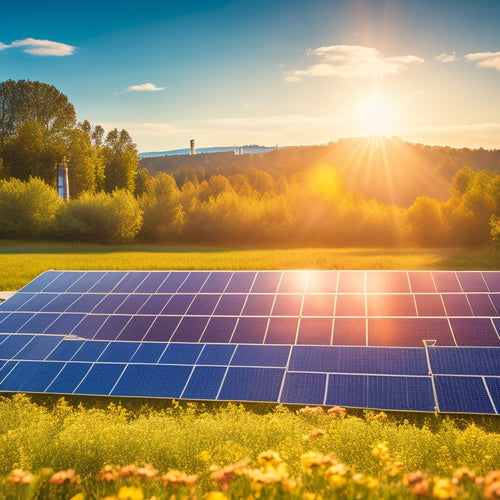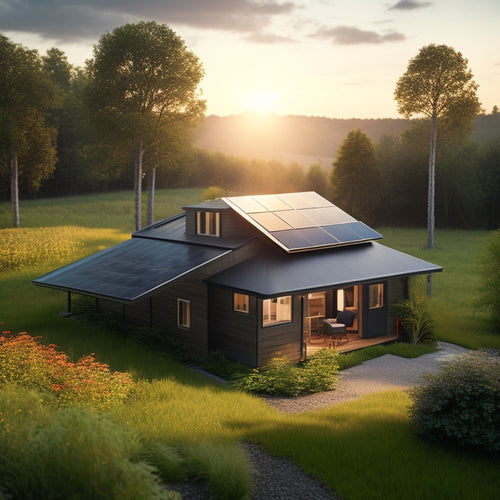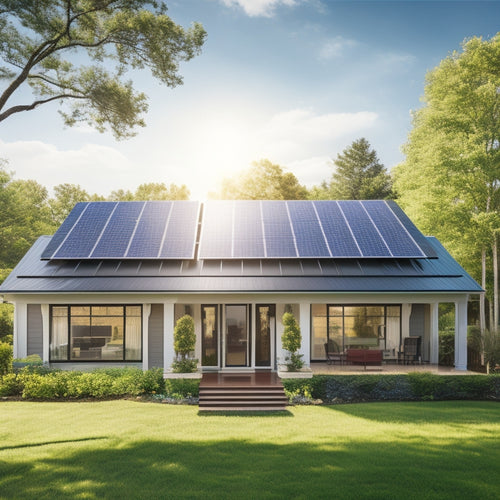
Solar System for Off Grid Living
Share
You're initiating a quest to unplug from the grid and utilize the power of renewable energy, and a well-designed solar system is the key to revealing your off-grid lifestyle. By calculating your daily energy usage and optimizing your power consumption patterns, you can guarantee a reliable energy supply customized to your unique needs. High-efficiency solar panels and advanced energy storage solutions will help you maximize your energy output and reduce your reliance on traditional energy sources. As you investigate the world of off-grid living, you'll find innovative technologies and sustainable practices that will enable you to take control of your energy independence - and the possibilities are endless.
The Essentials
- Off-grid solar systems provide energy independence, reducing reliance on public utilities and lowering carbon footprint.
- Accurate daily energy usage calculation is crucial for proper solar system sizing and efficient energy allocation.
- High-efficiency solar panels with advanced cell technologies enhance energy output, and quality batteries are essential for reliable energy storage.
- Energy conservation and mindful usage habits, along with energy-efficient appliances, help optimize energy production and reduce waste.
- Adopting renewable energy sources leads to a cleaner, sustainable lifestyle, and financial sustainability through significant cost savings.
Energy Independence Matters Most
You're seeking energy independence to break free from reliance on public utilities and reduce your carbon footprint.
By utilizing renewable energy sources, such as solar power, you can generate electricity on your own terms. This means you'll be powering your daily life with clean energy, from lights and appliances to communication devices and water pumps.
With a well-designed off-grid solar power system, you can overcome the complexity and uncertainty of installing a reliable system that meets your unique energy needs, and achieve a seamless shift to off-grid energy independence.
Renewable Energy Sources
By going off the grid, you're fundamentally severing your reliance on traditional energy sources, which makes utilizing renewable energy a crucial aspect of your new lifestyle.
You'll need to investigate various options to guarantee a consistent and reliable energy supply. Wind energy, hydro power, and geothermal heating are viable alternatives that can power your off-grid home. Biomass energy, generated from organic matter, can also contribute to your energy independence.
Solar thermal systems, which capture the sun's heat, can provide both hot water and space heating. For instance, a DIY off-grid solar system off-grid solar power can offer a solution to high energy bills and limited access to reliable power.
Additionally, embracing an off-grid lifestyle can be incredibly fulfilling, especially when you have the right tools and technology to support you.
To optimize your energy production, it's crucial to adopt energy conservation measures and sustainable practices. Conducting energy audits will help you identify areas of inefficiency and opportunities for improvement.
Hybrid systems, combining multiple renewable energy sources, can guarantee a stable energy supply. By adopting these renewable energy sources, you'll greatly reduce your climate impact, achieving a cleaner and more sustainable lifestyle.
Powering Daily Life
As your off-grid solar system generates electricity, powering daily life becomes a top priority. You'll need to take into account how to allocate your energy resources efficiently to meet your daily needs.
Proper solar panel placement is vital to maximize energy production. Make certain your panels are installed at an ideal angle and direction to capture the most sunlight. Incorporating a reliable home battery storage solution can also help enhance your energy consumption and reduce reliance on the grid. By storing excess energy generated by your solar panels, you can use it during off-peak hours or emergencies.
To conserve energy, implement these tips into your daily routine: turn off lights and appliances when not in use, use energy-efficient LED bulbs, and adjust your thermostat to minimize heating and cooling.
You can also invest in energy-efficient appliances and gadgets to reduce your overall energy consumption. By being mindful of your energy usage, you'll be able to enjoy the freedom and independence that comes with off-grid living.
With a well-designed solar system and conscious energy conservation, you'll be able to power your daily life without relying on the grid.
Zero Utility Bills Guaranteed
You're looking at a future with zero energy costs, where your solar system covers all your energy needs without incurring any additional expenses.
With the help of off-grid solar panel kits, you can easily generate power anywhere without electricity bills or grid connection. This means you can utilize renewable energy to power your home.
This means you won't have to worry about monthly payments, freeing up your budget for more important things.
With a well-designed solar system, you can say goodbye to utility bills and hello to a more financially sustainable lifestyle.
Zero Energy Costs
Tap into the power of the sun and slash your energy expenses to zero. With a solar system designed for off-grid living, you'll enjoy the freedom of zero energy costs. Say goodbye to rising utility bills and hello to solar savings.
| Cost Benefits | Description | Advantages |
|---|---|---|
| Zero Energy Costs | No monthly energy bills | Financial freedom |
| Lower Carbon Footprint | Renewable energy source | Environmental benefits |
| Increased Property Value | Solar system adds value to your property | Long-term investment |
| Energy Independence | No reliance on grid power | Off-grid living |
No Monthly Payments
With your solar system up and running, you can kiss those monthly energy bills goodbye. No more worrying about rising energy costs or budgeting for utility bills.
You'll enjoy the financial freedom that comes with generating your own clean energy. Your solar system will provide you with a stable source of power, shielding you from unpredictable energy market fluctuations.
You'll reap significant cost savings, as you'll no longer be reliant on the grid. This means you can allocate your hard-earned money towards more important things, such as investments, travel, or simply enjoying life.
Say goodbye to the anxiety that comes with receiving a hefty energy bill. With your solar system, you'll have zero utility bills guaranteed.
You'll be in control of your energy expenses, and your wallet will thank you. The cost savings will add up over time, providing you with a tangible return on your investment.
High-Efficiency Solar Panel Technology
You'll want to evaluate solar panels with high efficiency ratings, as they can greatly influence your energy output.
For instance, top rated solar panels for homes can deliver peak power output and minimize electricity bills.
Efficiency ratings typically range from 15% to 22%, with higher ratings indicating more energy produced per unit area.
Advanced cell technologies, such as bifacial cells and half-cut cells, can also enhance energy production and reduce losses.
Panel Efficiency Ratings
As the demand for renewable energy sources continues to rise, high-efficiency solar panels have become increasingly important for off-grid living.
When choosing a solar panel, you need to take into account the panel efficiency rating, which affects the amount of energy you can generate per unit area. Efficiency ratings vary among solar panel types, with monocrystalline silicon panels typically offering higher efficiencies than polycrystalline or thin-film panels.
When evaluating panel efficiency, you should take into account the maximum power output per unit area, measured in watts per square meter (W/m²). Higher-efficiency panels can produce more power in smaller spaces, making them ideal for off-grid systems where space is limited.
However, they often come at a higher cost. You'll need to balance efficiency with installation considerations, such as budget, available space, and system design.
Look for panels with high efficiency ratings (>20%) and low temperature coefficients to guarantee peak performance in various environmental conditions.
Advanced Cell Technology
High-efficiency solar panels owe their exceptional performance to advanced cell technologies that have revolutionized the industry.
These innovations have led to significant efficiency advancements, enabling you to generate more power from the same surface area. You'll benefit from higher energy conversion rates, which means more electricity for your off-grid living needs.
Advanced cell technologies have also improved cell lifespan, ensuring your solar panels remain efficient for a longer period. This is vital for off-grid living, where maintenance and replacement can be challenging.
With advanced cells, you can expect a longer lifespan, typically between 25 to 30 years or more, depending on the manufacturer.
Some of the key solar innovations driving this progress include bifacial cells, which can capture energy from both the front and back sides of the panel, and passivated emitter and rear cell (PERC) technology, which enhances energy conversion rates.
Assess Your Energy Demands
You need to determine your daily energy usage to size your off-grid solar system accurately.
To do this, you'll want to calculate your total daily energy consumption in watt-hours (Wh) by identifying the power consumption patterns of your appliances and devices. This involves tracking the wattage and usage hours of each item to get an accurate estimate of your energy demands.
As you assess your energy demands, consider investing in energy efficiency measures, such as replacing traditional incandescent bulbs with LED bulbs, to reduce your overall energy consumption.
Daily Energy Usage
Determining your daily energy usage is an essential step in designing a solar system for off-grid living, since it directly impacts the system's size and cost.
To accurately assess your energy demands, you'll need to calculate your daily energy usage in watt-hours (Wh). This involves tracking your energy consumption patterns over a period of time, typically a week or a month, to get a representative illustration of your energy needs.
You can use energy monitoring devices or smart plugs to measure the power consumption of individual appliances and lighting systems. This data will help you identify areas for usage optimization, such as replacing incandescent bulbs with LEDs or upgrading to energy-efficient appliances.
Power Consumption Patterns
Take stock of your daily habits to pinpoint the times when your energy usage peaks and dips. By doing so, you'll gain a deeper understanding of your energy habits and identify areas where you can optimize your consumption.
Start by tracking your energy usage throughout the day, from the moment you wake up to when you go to bed. Note the times when you use the most energy-intensive appliances, such as the refrigerator, air conditioner, or electric oven.
This exercise will help you develop consumption awareness, allowing you to make informed decisions about your energy usage. You may uncover that you're using more energy than necessary during certain hours of the day or that you can reduce your consumption by making a few simple changes to your daily routine.
Longer Battery Life Guaranteed
You can enhance energy storage by selecting high-quality, deep-cycle batteries designed specifically for off-grid solar systems.
These batteries feature thicker plates and a more durable construction, allowing them to withstand the frequent charge and discharge cycles that come with off-grid living.
Boost Energy Storage
As your off-grid living system relies heavily on energy storage, maximizing battery life becomes a top priority. You need to guarantee your batteries are efficient, reliable, and long-lasting to power your home, farm, or cabin.
To enhance energy storage, you'll want to select the right battery types for your system. Lead-acid batteries, lithium-ion batteries, and nickel-cadmium batteries are popular options, each with their pros and cons.
Consider factors like storage capacity, depth of discharge, and cycle life when choosing the best battery for your needs.
For instance, lithium-ion batteries offer high energy density, long cycle life, and low maintenance, making them an ideal choice for off-grid systems. However, they can be more expensive than other options.
On the other hand, lead-acid batteries are more affordable but have lower energy density and shorter lifetimes.
Frequently Asked Questions
Can I Use Solar Panels With My Existing Electrical System?
You can integrate solar panels with your existing electrical system, but first, verify the system's compatibility by checking the voltage, current, and power ratings, and potentially upgrading your electrical panel to accommodate the new renewable energy source.
Are Solar Systems Resistant to Extreme Weather Conditions?
You'll be relieved to know that solar panels are designed with durability in mind, offering extreme weather resilience against harsh conditions like hail, high winds, and heavy snow loads, ensuring your energy independence remains uninterrupted.
How Often Should I Clean My Solar Panels for Optimal Performance?
You'll want to clean your solar panels every 6-12 months, depending on your location's pollution and debris levels, to guarantee peak energy output; regular panel maintenance through proper cleaning frequency will maximize your system's efficiency.
Can I Sell Excess Energy Back to the Grid With Off-Grid Living?
You can sell excess energy back to the grid, but it requires a grid connection, compliance with local regulations, and often, energy storage via battery systems; financial incentives may apply, but they vary, so research and plan carefully to maintain your energy independence.
Are Solar Systems Compatible With Generators or Wind Turbines?
As you're seeking energy independence, it's no coincidence you're wondering if solar systems play nicely with generators or wind turbines. Fortunately, hybrid systems combine these power sources seamlessly, ensuring a reliable and efficient energy supply that's all yours.
Final Thoughts
You've taken the first step towards energy independence. With a solar system designed for off-grid living, you'll enjoy zero utility bills and high-efficiency energy harvesting. For instance, the Johnson family, who live in a remote cabin in Colorado, went off-grid with a 5kW solar array and 24kWh battery bank. They now power their home, water pump, and refrigerator with 100% renewable energy, saving over $3,000 annually on utility bills. Your path to energy freedom starts here.
Related Posts
-

Advantages of Solar Generating Systems Over Traditional Energy
Solar generating systems provide several key advantages over traditional energy sources. You'll experience lower long...
-

Diy Off Grid Solar
By embracing DIY off-grid solar, you can break free from grid dependence, slashing your energy bills by up to 90% and...
-

Home Solar Installation Cost
You're considering installing solar panels on your home, and the upfront cost is likely the biggest hurdle standing i...


